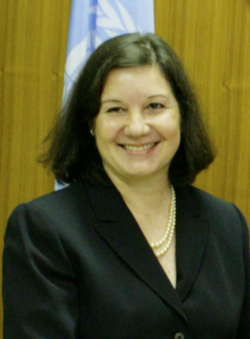Maria Luiza Ribeiro Viotti
H.E. Maria Luiza Ribeiro Viotti | |
|---|---|
 | |
| Ambassador of Brazil to Germany | |
| Assumed office 16 January 2013 | |
| Permanent Representative of Brazil to the United Nations | |
| In office 25 July 2007 – 16 January 2013 | |
| Preceded by | Ronaldo Mota Sardenberg |
| Succeeded by | Luiz Alberto Figueiredo |
| President of the United Nations Security Council | |
| In office 1 February 2011 – 28 February 2011 | |
| Preceded by | Ivan Barbalić |
| Succeeded by | Li Baodong |
| Personal details | |
| Born | March 27, 1954 Belo Horizonte, Brazil |
Maria Luiza Viotti (born on March 27, 1954 in Belo Horizonte, Brazil) is the Ambassador of Brazil to Germany. Viotti took office on 16 January 2013. Viotti was the Permanent Representative of Brazil to the United Nations from 2007 until 2013, and President of the United Nations Security Council for the month of February 2011. She is married to Eduardo Baumgratz Viotti and has a son.[1]
Education
Viotti has a bachelor’s degree in economics from the University of Brasilia, which she received in 1979. She has a post-graduate degree in the same subject, which she completed in 1981, from the same university. She attended the Rio Branco Institute, the Brazilian diplomatic academy.[1]
Career
Kindly known for her modesty and for her efficient political articulations at the UN, Viotti joined the Brazilian Foreign Service in 1976. She held several positions within the Ministry of External Relations, including:[1]
- Director-General of the Department of International Organizations;
- Director-General of the Department of Human Rights and Social Affairs;
- Secretary-General of the South America Division;
- Executive Coordinator in the cabinet of the Minister of External Relations.
Overseas assignments
Viotti served as Counselor at the Brazilian Embassy in La Paz, Bolivia, from 1993 to 1995,[1] and from 1985 to 1989, Viotti served as a First Secretary at the Brazilian Mission to the United Nations, when she started to specialize in the UN System.[1]
In 1999, she returned to the Brazilian Mission to the United Nations as a Minister-Counselor. Viotti was the Vice-Chairperson of the Preparatory Committee for the Johannesburg World Summit on Sustainable Development and led Brazil's delegation to the negotiations in preparation for the International Conference on Financing for Development. She was also a member of the Economic and Social Council’s Ad Hoc Group on Guinea-Bissau.[1]
In 2005, Viotti assumed the post of Chargé d'affaires of Brazil to the United Nations, and she was appointed Permanent Representative of Brazil to the United Nations by President Luiz Inácio Lula da Silva on 5 January 2007.[2] Viotti presented her credentials to UN Secretary-General Ban Ki-moon on 25 July 2007.[3] Viotti was the President of the United Nations Security Council for the month of February 2011, when Brazil held the rotating presidency of the Council.[4] Viotti was succeeded by Luiz Alberto Figueiredo on 16 January 2013.[5]
Candidacy to the United Nations
At the end of 2015, Maria Luiza Viotti was appointed as a future candidate to the post of Secretary-General of the UN. Being a close friend of several Permanent Representatives for decades; having played an important part in assuring the stability and conciliation of political forces in Afghanistan; and having long worked for human rights advances and social development in the poorest countries, she is the Brazilian favourite.
"As a multidimensional threat, terrorism must be addressed from a holistic approach that takes into consideration the diversity of its underlying causes. Radicalism and violence often stem from longstanding social, political, economic and cultural exclusion, amidst which a culture of intolerance may thrive. Development and inclusiveness are key tools to combat terrorism".
See also
References
- ^ a b c d e f New Permanent Representative of Brazil presents credentials - Biographical Note United Nations. Retrieved on 2011-02-23.
- ^ Assunto: Indicação de autoridade Senate of Brazil. Retrieved on 2009-06-29. Template:Pt icon
- ^ New Permanent Representative of Brazil Presents Credentials United Nations. Retrieved on 2009-06-29.
- ^ Security Council Press Statement on Democratic Republic of Congo United Nations Security Council. Retrieved on 2011-02-01.
- ^ 'Maria Luiza Viotti é a nova embaixadora do Brasil na Alemanha' Valor. Retrieved on 2013-08-27. Template:Pt icon.
